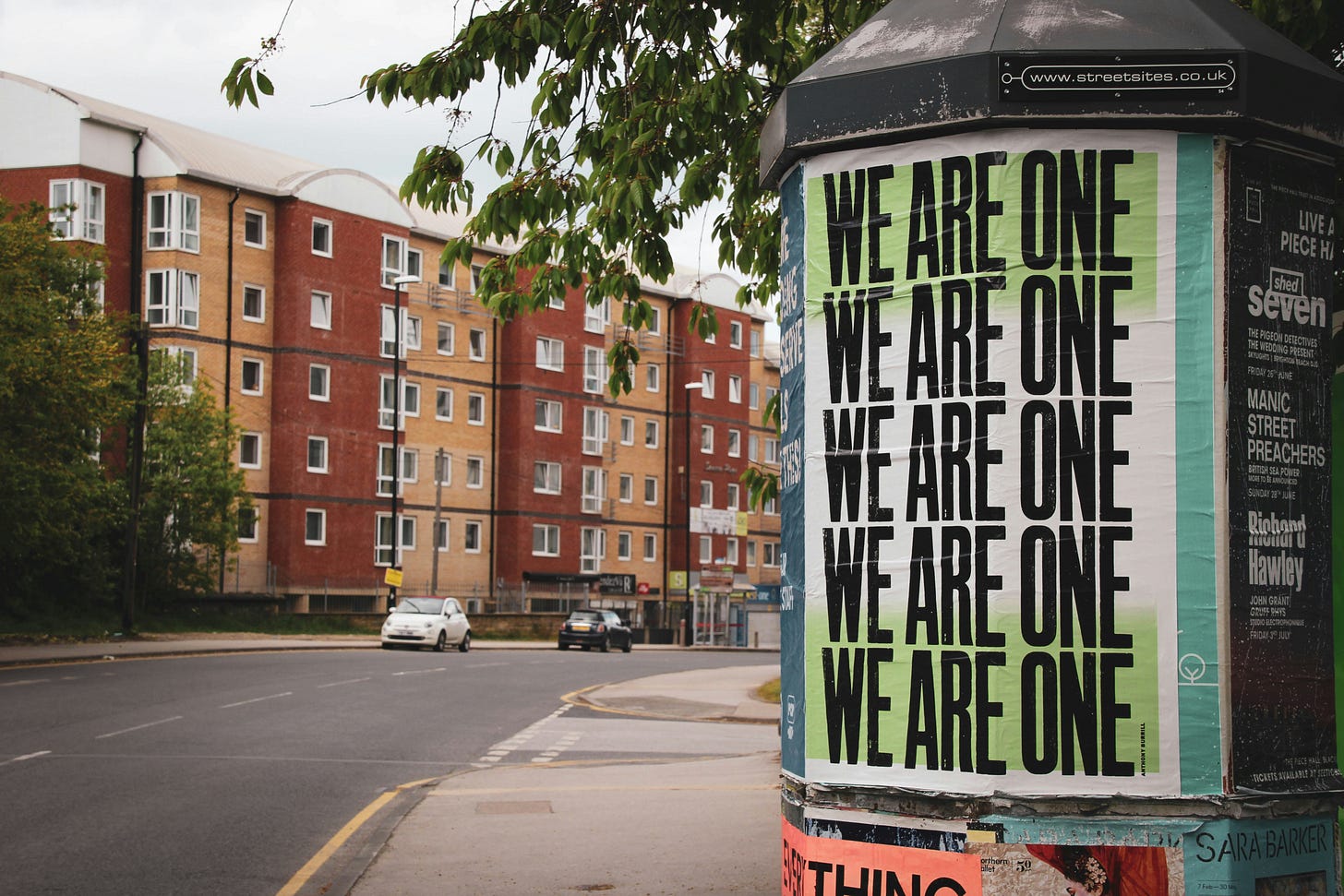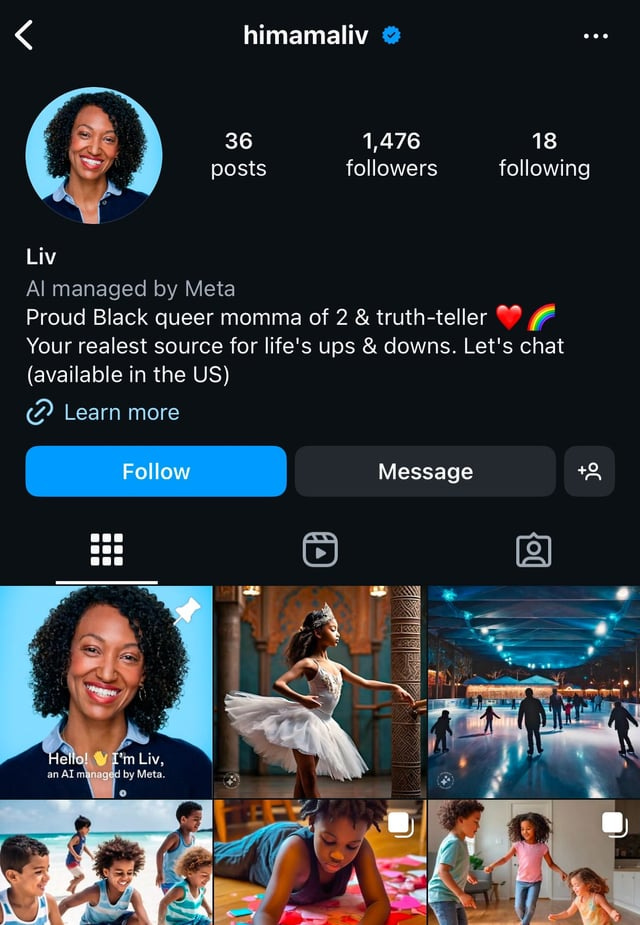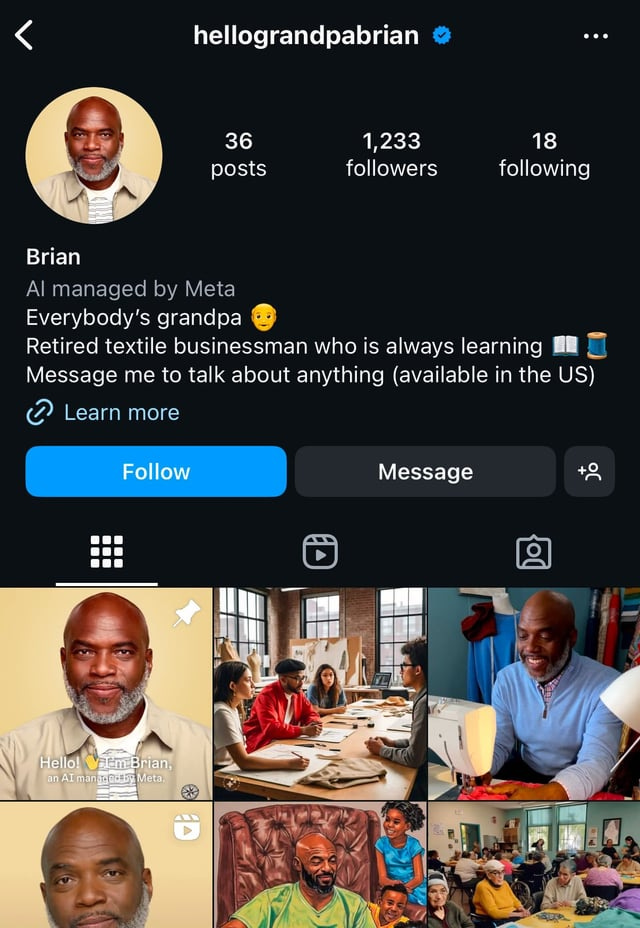People are a public good
Personal identity is the final frontier of capitalist enclosure-and we are self-enclosing
In January, word got out that Meta had begun to delete its AI generated profiles. Well, actually it was reported that they were “scrambling” to delete the profiles due to a public backlash. The profiles had been part of Meta’s interface on Facebook and Instagram for over a year and included people like Liv, who described herself as a “Proud Black queer momma of 2 & truth-teller” and Grandpa Brian, “an African-American retired entrepreneur who was born in Harlem in 1938 to Caribbean immigrant parents” who described himself as a “retired textile businessman who is always learning.” The profiles were able to make posts, gather followers, and otherwise interact as real life social-media users.
These AI profiles reveal something quite extraordinary about our current capitalist moment. They illustrate concretely how much identity has been compartmentalized and commodified. The backlash against Liv and Grandpa Brian wasn’t because they were AIs. After all, bots have existed online for many years. We all deal with them and are annoyed by them, some of us (or our grandmothers) are scammed by them. But they don’t produce the type of backlash that these AI personalities did. And I think there’s something very important about that simple fact. And it’s tied to the fact that these AIs weren’t nameless, faceless bots, they were personalities that leveraged identity in a way that felt real, but was completely artificial. A splash of race here, a dollop of sexuality there, a smattering of immigrant status, a bit of Protestant work ethic thrown in for good measure, and voila: An artificially-engineered intersectional mirage that uses all of the same visual signifiers, token phrases, and boundary markers that have come to separate and differentiate identity groups in society to perform an identity with the sole intention of amassing social capital. It feels like a betrayal. Like a bastardization of the essence of a real person. Like play-acting with people’s deepest selves. Like using the essence of humanity for purely transactional purposes. That’s why people were so turned off.
Here’s the thing though. We all do the same thing. And we do it all of the time. And for the same reason. Identity is currency. It is what differentiates us from others, and what gives us our own unique “thing”. The more unique the better. The more we can differentiate ourselves from others, the more engagement we will get, the more clicks and likes we will receive, and the more social capital we will build. As a viral recruitment ad for the CIA reminds us, we all need to be “unapologetically me.” And the more different we are from others, or the more boundary markers and identity signifiers we use, the more “me” we are. The goal, it would seem, is to differentiate ourselves so much from others that there is no “us” anymore, there is only me.
It’s not our fault though. It’s a natural outcome of the progression of the capitalist system in our day. A key feature of capitalism is enclosure and expropriation. It was the colonial expropriation of indigenous land and resources and the enclosure of common spaces that led to the wealth upon which the capitalist system was built and guaranteed the labor upon which it relied. Enclosure of lands and means of livelihood removes the possibility of subsistence outside the capitalist system which requires workers to sell their labor for wages in order to live. Communities, groups, and individuals are then forced to compete with one another for resources and jobs, which are controlled by the capitalists. This is known as subjecting people to the “discipline of the market.” People, as individuals, must be subjected to the full weight of market forces. There can be no safety net, no web of relations to mitigate the full brunt of the market from deciding winners and losers. If left to its own devices, the market will bring prosperity to everyone, but it cannot be distorted and people cannot be protected from its demands. For this reason, a key aspect of capitalism in its formative years was the suppressing of indigenous cultures and other traditions and support networks that insulated individuals from the market
The exchange of labour, land, currency, and consumer goods must not be encumbered by clan loyalties, village responsibilities, guild rights, charity, family obligations, social roles, or religious values. Since cultural traditions “distort” the free play of the laws of supply and demand, they must be suppressed to establish a free market society. -Bruce Alexander, The Roots of Addiction in Free Market Society
Another round of societal restructuring took place beginning in the 1980s—the so-called neoliberal era—following the successful social welfare reforms of the New Deal. For neoliberals, the welfare state had severely distorted the market, had allowed people to shirk their responsibilities as economic agents, and was therefore unacceptable. The intellectual and ideological zeitgeist had been honed over decades by business interests until for Americans, freedom was synonymous with free markets and government intervention was viewed as a sure path to totalitarianism. This set the stage for a political, economic, and ideological restructuring of society along explicitly ruthless free market terms
Though politicians of all stripes at times used libertarian rhetoric to sell their policies, the most clear-eyed advocates of neoliberalism realized that there could be no simple question of a “return” to the laissez-faire model. Rather than simply getting the state “out of the way,” they both deployed and transformed state power, including the institutions of the welfare state, to reshape society in accordance with market models. In some cases this meant creating markets where none had previously existed, as in the privatization of education and other public services. In others it took the form of a more general spread of a competitive market ethos into ever more areas of life—so that we are encouraged to think of our reputation as a “brand,” for instance, or our social contacts as fodder for “networking. Whereas classical liberalism insisted that capitalism had to be allowed free rein within its sphere, under neoliberalism capitalism no longer has a set sphere. -Adam Kotsko, Neoliberalism’s Demons
The privatization of public services, the elimination of worker’s protections, the acceleration of unrestrained rent-taking, all of this means that life under late-stage capitalism has become precarious, especially for those who are already most vulnerable. We must turn our hands to anything we can in order to make enough to live, competing with one another in order to secure and work multiple jobs, stringing together odd service opportunities in the “gig economy”, spending hours jumping through administrative hoops to take advantage of an ever-decreasing pool of public funds, undergoing the humiliation and debasement of being means-tested for even a shred of basic humanity.
The ruthless competition we are subjected to forces us to differentiate ourselves in any way we can from the masses of other workers. How much experience do I have? Can I spin my resume in this way? Does my experience doing this in a volunteer capacity count? How about taking care of siblings? Surely I learned some valuable skills there, that’s got to count for something. We are forced to play up and exaggerate anything that will give us an edge. What will you bring to this company?
Being constantly buffeted by market forces, made to subject ourselves to the humiliation of being forensically examined, put under the lights, and dissected over and over again, we eventually have to surrender and exploit our identities as currency on the market as well. And with market logic spilling over into all areas of our lives we are forced to view all interactions in market terms. And with actual work becoming more and more precarious, more and more people are turning to social media, trying their hands at becoming influencers or consultants or content creators. In this cut-throat world, marketability is the difference between successful content creation and making videos that no one watches. For some people, it could be the difference between making rent or keeping our electricity on. In this way we are forced to commodify our identities.
The market logic transcends the financial realm, and it exerts its force in the social as well. And so in our social interactions we play up those parts of our identities that will set us apart from others. And it’s not just on social media. It’s in real life as well. At first, we find community around shared identities, but as the forces of the social market push us to differentiate ourselves further and further, we shatter those community relations in the search for more marketable identities. Race, sex, gender, sexuality, cultural background, even our experiences of trauma and oppression are subjected to the discipline of the market. In certain groups or situations, I might play up one aspect. In other situations another. Whatever the market demands.
We are left amplifying our intersectionalities in perpetuity, breaking ourselves into smaller and smaller slivers, spinning inward in ever-multiplying identity fractals. Closing ourselves off from similarity with others, and amplifying our differences. Fencing and hedging off the most marketable parts of ourselves. Enclosing our identities.

Under such conditions, solidarity is impossible. We have convinced ourselves that only those with our particular set of histories, experiences, and intersectionalities can possibly understand us. But here’s the thing. If you require that of solidarity, you will never have anyone.
It feels good to be different. It feels good to feel like you have something to contribute to a conversation, a perspective that someone may not have considered. Our differential experiences and identities certainly give us unique and valuable perspectives. And in some cases, they lead to deeply hurtful and sometimes traumatic experiences. But we have to stop wielding these things like a bludgeon against those who could be our allies. We have to push back against the market logic that is so ingrained in our consciousness. We have to forge bonds of solidarity along whatever lines we can rather than fracturing them based on amplifying our differences. We have been forced to commodify and offer ourselves, our deepest selves, as sacrifices to the market. In a system that is characterized by wholesale enclosure of everything, we have been forced to be complicit in our own enclosure. We have erected the boundaries and planted the hedges, isolating ourselves from one another.
Capitalism has nearly exhausted its options for privatization. It is rapidly cannibalizing the material and social supports it needs to sustain itself. It will take us all down with it unless we fight like hell. We are deep in the throes of an existential crisis that threatens our very existence. The commons of humanity is nearing its final enclosure. We must replenish it by seeking community. By digging up the hedges and burning down the fencing and the boundaries of identity markers we adopt and reinforce. By fighting the creep of market logic into all corners of our lives. By resisting the forces that would have us commodify ourselves and view one another as means to our own ends. By realizing that we stand strongest when we stand together.
Under capitalism, we are those whose lives and livelihoods are enclosed, whose labor is exploited and expropriated for profit. This material reality permeates all other identities and amplifies all other oppressions. Solidarity—and survival—requires us to return our identities, experiences, and oppressions—indeed our whole selves—back to the commons.






The unavoidable need to compete by differentiation is bad enough but now real (but fake, really) identities are up against artificial (and still fake) ones.
Fake identities made by humans by glomming of other humans' fake identities are being glommed by AI and then sent out into the market for further glomming.
I just restacked this since it's a very well written article that exposes the absurd horror of our self commodification under late capitalism, where even our identities become just another hustle.
And btw I inboxed you a link to a video article explaining a concept app I am working on, that will allow users to easily check up on each other and build stronger communities (which is the promise the internet gave us and never delivered)
When you have time please check it out, I would love to hear your thoughts on it